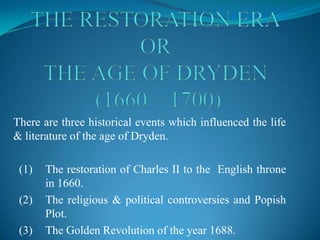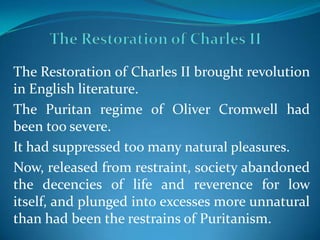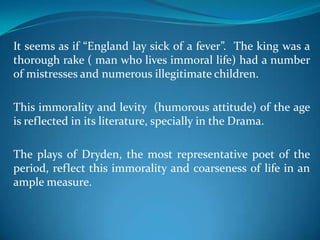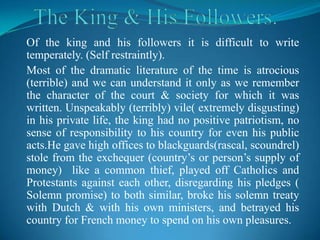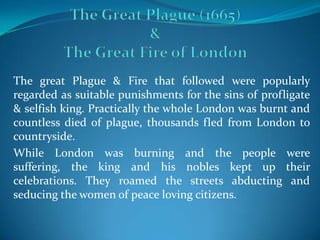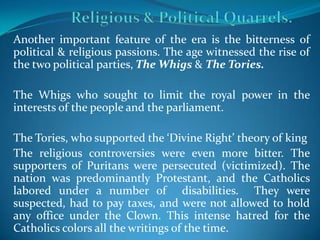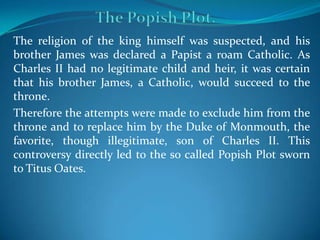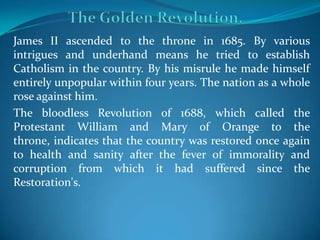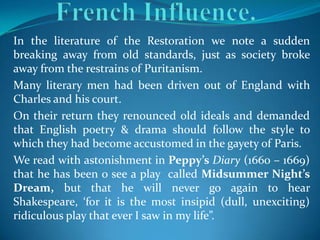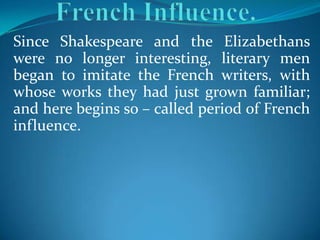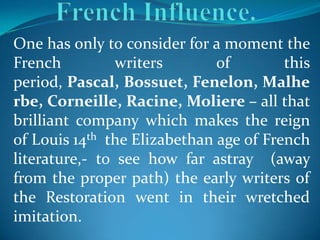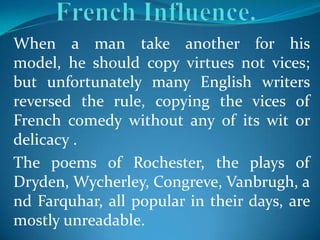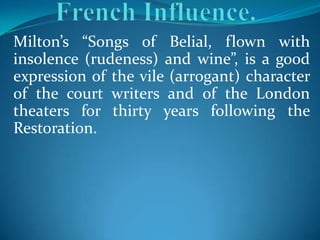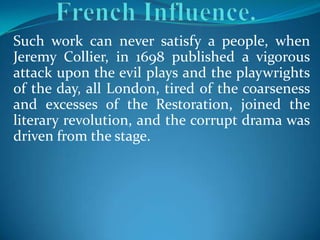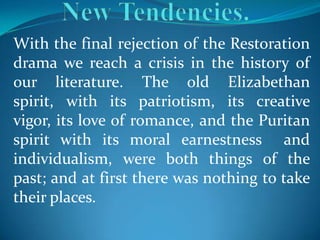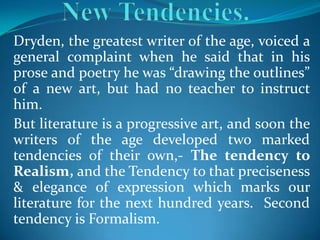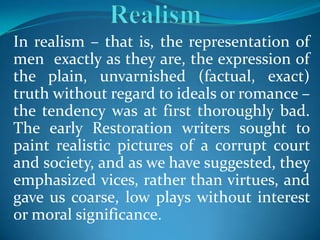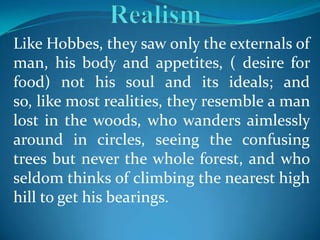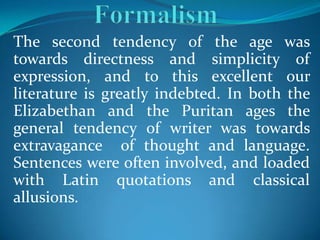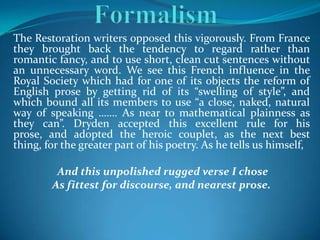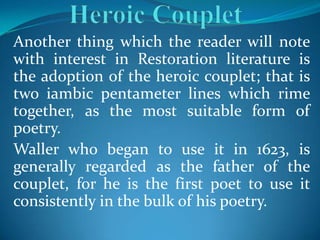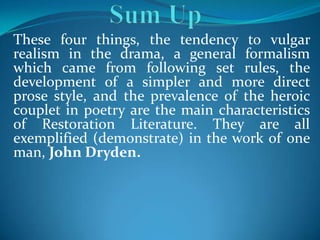Restoration presentation
- 1. There are three historical events which influenced the life & literature of the age of Dryden. (1) The restoration of Charles II to the English throne in 1660. (2) The religious & political controversies and Popish Plot. (3) The Golden Revolution of the year 1688.
- 2. The Restoration of Charles II brought revolution in English literature. The Puritan regime of Oliver Cromwell had been too severe. It had suppressed too many natural pleasures. Now, released from restraint, society abandoned the decencies of life and reverence for low itself, and plunged into excesses more unnatural than had been the restrains of Puritanism.
- 3. It seems as if ŌĆ£England lay sick of a feverŌĆØ. The king was a thorough rake ( man who lives immoral life) had a number of mistresses and numerous illegitimate children. This immorality and levity (humorous attitude) of the age is reflected in its literature, specially in the Drama. The plays of Dryden, the most representative poet of the period, reflect this immorality and coarseness of life in an ample measure.
- 4. Of the king and his followers it is difficult to write temperately. (Self restraintly). Most of the dramatic literature of the time is atrocious (terrible) and we can understand it only as we remember the character of the court & society for which it was written. Unspeakably (terribly) vile( extremely disgusting) in his private life, the king had no positive patriotism, no sense of responsibility to his country for even his public acts.He gave high offices to blackguards(rascal, scoundrel) stole from the exchequer (countryŌĆÖs or personŌĆÖs supply of money) like a common thief, played off Catholics and Protestants against each other, disregarding his pledges ( Solemn promise) to both similar, broke his solemn treaty with Dutch & with his own ministers, and betrayed his country for French money to spend on his own pleasures.
- 5. The great Plague & Fire that followed were popularly regarded as suitable punishments for the sins of profligate & selfish king. Practically the whole London was burnt and countless died of plague, thousands fled from London to countryside. While London was burning and the people were suffering, the king and his nobles kept up their celebrations. They roamed the streets abducting and seducing the women of peace loving citizens.
- 6. Another important feature of the era is the bitterness of political & religious passions. The age witnessed the rise of the two political parties, The Whigs & The Tories. The Whigs who sought to limit the royal power in the interests of the people and the parliament. The Tories, who supported the ŌĆśDivine RightŌĆÖ theory of king The religious controversies were even more bitter. The supporters of Puritans were persecuted (victimized). The nation was predominantly Protestant, and the Catholics labored under a number of disabilities. They were suspected, had to pay taxes, and were not allowed to hold any office under the Clown. This intense hatred for the Catholics colors all the writings of the time.
- 7. The religion of the king himself was suspected, and his brother James was declared a Papist a roam Catholic. As Charles II had no legitimate child and heir, it was certain that his brother James, a Catholic, would succeed to the throne. Therefore the attempts were made to exclude him from the throne and to replace him by the Duke of Monmouth, the favorite, though illegitimate, son of Charles II. This controversy directly led to the so called Popish Plot sworn to Titus Oates.
- 8. James II ascended to the throne in 1685. By various intrigues and underhand means he tried to establish Catholism in the country. By his misrule he made himself entirely unpopular within four years. The nation as a whole rose against him. The bloodless Revolution of 1688, which called the Protestant William and Mary of Orange to the throne, indicates that the country was restored once again to health and sanity after the fever of immorality and corruption from which it had suffered since the Restoration's.
- 9. In the literature of the Restoration we note a sudden breaking away from old standards, just as society broke away from the restrains of Puritanism. Many literary men had been driven out of England with Charles and his court. On their return they renounced old ideals and demanded that English poetry & drama should follow the style to which they had become accustomed in the gayety of Paris. We read with astonishment in PeppyŌĆÖs Diary (1660 ŌĆō 1669) that he has been o see a play called Midsummer NightŌĆÖs Dream, but that he will never go again to hear Shakespeare, ŌĆśfor it is the most insipid (dull, unexciting) ridiculous play that ever I saw in my lifeŌĆØ.
- 10. Since Shakespeare and the Elizabethans were no longer interesting, literary men began to imitate the French writers, with whose works they had just grown familiar; and here begins so ŌĆō called period of French influence.
- 11. One has only to consider for a moment the French writers of this period, Pascal, Bossuet, Fenelon, Malhe rbe, Corneille, Racine, Moliere ŌĆō all that brilliant company which makes the reign of Louis 14th the Elizabethan age of French literature,- to see how far astray (away from the proper path) the early writers of the Restoration went in their wretched imitation.
- 12. When a man take another for his model, he should copy virtues not vices; but unfortunately many English writers reversed the rule, copying the vices of French comedy without any of its wit or delicacy . The poems of Rochester, the plays of Dryden, Wycherley, Congreve, Vanbrugh, a nd Farquhar, all popular in their days, are mostly unreadable.
- 13. MiltonŌĆÖs ŌĆ£Songs of Belial, flown with insolence (rudeness) and wineŌĆØ, is a good expression of the vile (arrogant) character of the court writers and of the London theaters for thirty years following the Restoration.
- 14. Such work can never satisfy a people, when Jeremy Collier, in 1698 published a vigorous attack upon the evil plays and the playwrights of the day, all London, tired of the coarseness and excesses of the Restoration, joined the literary revolution, and the corrupt drama was driven from the stage.
- 15. With the final rejection of the Restoration drama we reach a crisis in the history of our literature. The old Elizabethan spirit, with its patriotism, its creative vigor, its love of romance, and the Puritan spirit with its moral earnestness and individualism, were both things of the past; and at first there was nothing to take their places.
- 16. Dryden, the greatest writer of the age, voiced a general complaint when he said that in his prose and poetry he was ŌĆ£drawing the outlinesŌĆØ of a new art, but had no teacher to instruct him. But literature is a progressive art, and soon the writers of the age developed two marked tendencies of their own,- The tendency to Realism, and the Tendency to that preciseness & elegance of expression which marks our literature for the next hundred years. Second tendency is Formalism.
- 17. In realism ŌĆō that is, the representation of men exactly as they are, the expression of the plain, unvarnished (factual, exact) truth without regard to ideals or romance ŌĆō the tendency was at first thoroughly bad. The early Restoration writers sought to paint realistic pictures of a corrupt court and society, and as we have suggested, they emphasized vices, rather than virtues, and gave us coarse, low plays without interest or moral significance.
- 18. Like Hobbes, they saw only the externals of man, his body and appetites, ( desire for food) not his soul and its ideals; and so, like most realities, they resemble a man lost in the woods, who wanders aimlessly around in circles, seeing the confusing trees but never the whole forest, and who seldom thinks of climbing the nearest high hill to get his bearings.
- 19. The second tendency of the age was towards directness and simplicity of expression, and to this excellent our literature is greatly indebted. In both the Elizabethan and the Puritan ages the general tendency of writer was towards extravagance of thought and language. Sentences were often involved, and loaded with Latin quotations and classical allusions.
- 20. The Restoration writers opposed this vigorously. From France they brought back the tendency to regard rather than romantic fancy, and to use short, clean cut sentences without an unnecessary word. We see this French influence in the Royal Society which had for one of its objects the reform of English prose by getting rid of its ŌĆ£swelling of styleŌĆØ, and which bound all its members to use ŌĆ£a close, naked, natural way of speaking ŌĆ”ŌĆ”. As near to mathematical plainness as they canŌĆØ. Dryden accepted this excellent rule for his prose, and adopted the heroic couplet, as the next best thing, for the greater part of his poetry. As he tells us himself, And this unpolished rugged verse I chose As fittest for discourse, and nearest prose.
- 21. Another thing which the reader will note with interest in Restoration literature is the adoption of the heroic couplet; that is two iambic pentameter lines which rime together, as the most suitable form of poetry. Waller who began to use it in 1623, is generally regarded as the father of the couplet, for he is the first poet to use it consistently in the bulk of his poetry.
- 22. These four things, the tendency to vulgar realism in the drama, a general formalism which came from following set rules, the development of a simpler and more direct prose style, and the prevalence of the heroic couplet in poetry are the main characteristics of Restoration Literature. They are all exemplified (demonstrate) in the work of one man, John Dryden.

